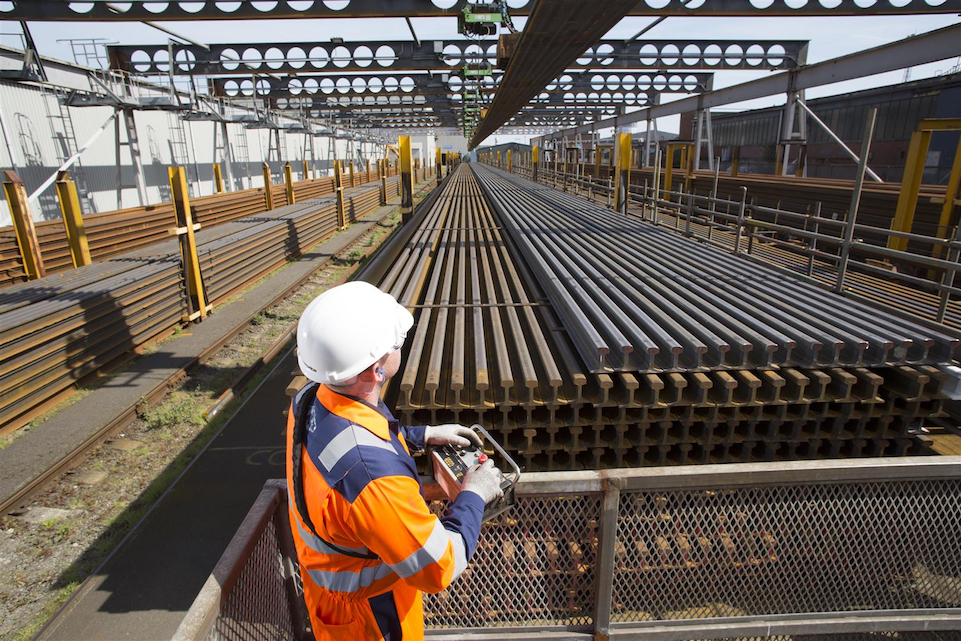Virgin steel is needed to make rail tracks. For that, you need steel blast furnaces. On Saturday, Britain’s last remaining blast furnaces were saved by an extraordinary government intervention. In a rare weekend sitting of parliament, legislation was passed to take public control of the steelworks at Scunthorpe in Lincolnshire, on the English east coast. It means that Britain retains the means to manufacture its own rails.
It is being regarded as the saving of Scunthorpe from questionable Chinese owners. Its rail production and rail infrastructure are, of course, much less important than the 2,500 jobs that are reprieved. However, the ability to manufacture virgin (also called “bright”) steel is regarded as a matter of national strategic importance. Loss of the plant would have been a crippling blow to many associated industries, rail freight among them.
All rails lead from Scunthorpe
Matters moved on rapidly from last week’s threatened closure. Scunthorpe’s owners, the Jingye corporation of China, rejected a rescue bid. The situation became critical when the Chinese company attempted to cancel shipments of coking coal and iron ore. Without the fuel and raw materials, the blast furnaces would have gone cold. In steel-making terms, that is a life-ending scenario. The ageing furnaces, one of which has been continuously fired for almost 90 years, would be lost.

Scunthorpe’s twin blast furnaces are the only remaining examples in the UK. The closure last year of Port Talbot in Wales left the Lincolnshire plant out on its own. The loss of Scunthorpe would have left Britain as the only nation in the G7 economic grouping unable to produce virgin steel (the other members are Canada, France, Germany, Italy, Japan, and the United States).
It’s nationalisation, Jon, but not as we know it
The gravity of the situation was emphasised by the recall during parliamentary recess and for a weekend sitting. The last time such circumstances were invoked was in 1982. That was to debate a war response to the Argentinian invasion of the Falkland Islands. Legislation, which normally can take months, passed through both houses of parliament in one afternoon. It received the signature of King Charles (Royal Assent) in less than twelve hours.

The Government is refusing to call it a nationalisation. However, the Business Secretary, Jonathan Reynolds, has been given leave by parliament to take any necessary means to secure the immediate future of the plant. Nationalisation it may not be, but whatever civilian equivalent there may be to a field marshal commission has been bestowed on UK Business Secretary Jonathan Reynolds to be general manager of the works.
Rail freight on standby to deliver
The immediate battle plan is to ensure the delivery of ore and coke to the plant. That is normally landed by sea at Immingham and transferred by road to Scunthorpe. However, if circumstances demand it, rail infrastructure could be used to deliver the urgent coking coal, if it were necessary to land it at any other port.

The British government had accused the Chinese owners of acting irrationally and blocking moves to save the plant. In the debate in the House of Commons, politicians argued that there was no other course of action left open to them. The government had already pledged £500m (€585m) in an interim payment to tide over the plant, which Jingye say is losing £700,000 (€820,000) every day. The level of financial intervention is the largest single government bailout since the banking crisis of 2008.
Roller coaster investment ride
Plans had been in hand to modernise the logistics of the operation between Immingham and Scunthorpe. The present road transfer of bulk deliveries is considered unsatisfactory. It was hoped that a rail connection would be made suitable for the 20-mile (32km) transfer from the purpose-built port to the steel works. That is obviously on hold for now.

If the government proceeds to full nationalisation, then the plant could be in line for modernisation. The younger of the two blast furnaces is around 70 years old. That would be a significant further investment, say government sources.
Railway nationalisation dress rehearsal
With the nationalisation of the railways already in motion, political parties are closely watching how the ruling Labour Party performs in this dress rehearsal for public ownership of a national strategic asset.
However, it was not all gloomy news to come out of the UK last week. At the same time as submitting to a round of media interviews on Sunday, Jonathan Reynolds took the opportunity to remind the public that Britain was the recipient of a “major investment” from Universal Studios to build a “world-class” theme park in the not very economically challenged Oxford-Cambridge Arc. He mused that metal would be needed for all those roller coasters – but didn’t speculate on the name. It for sure will not be “SteelWorld”.